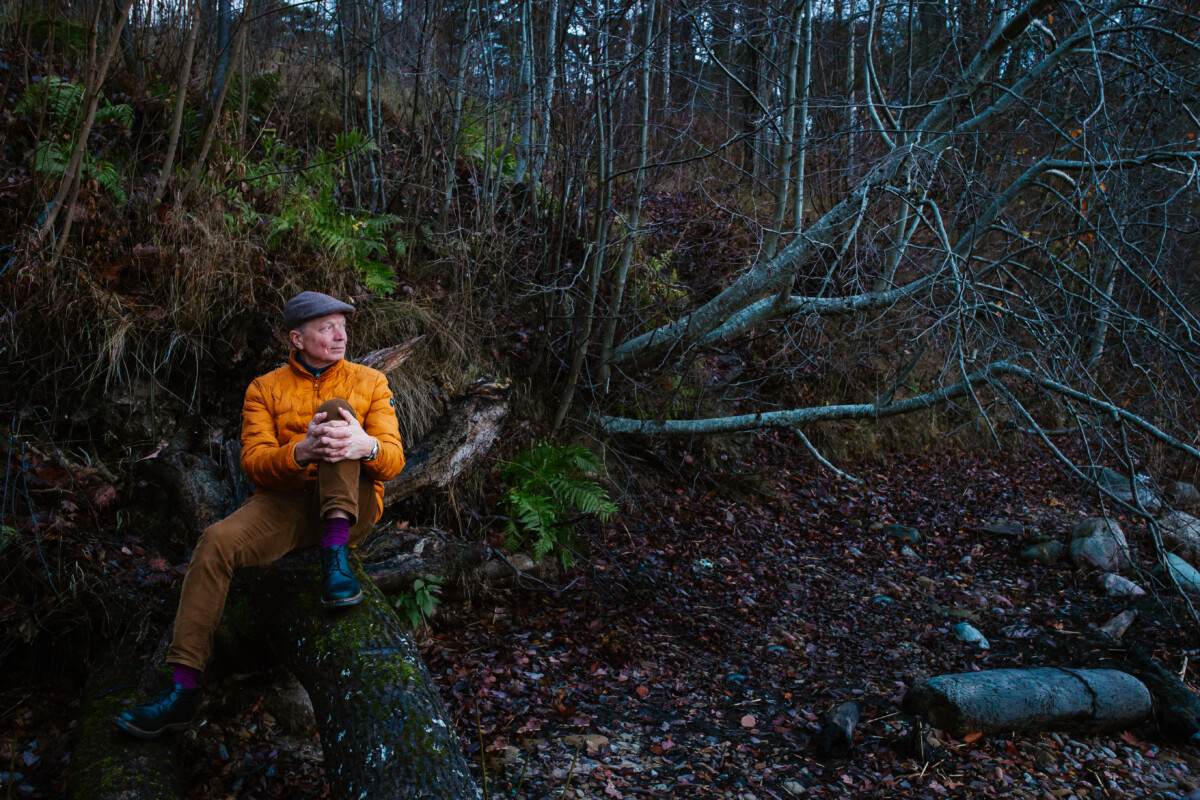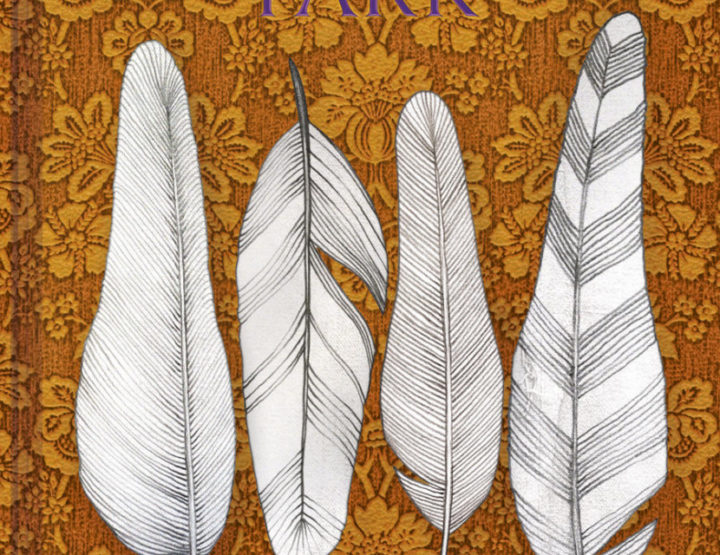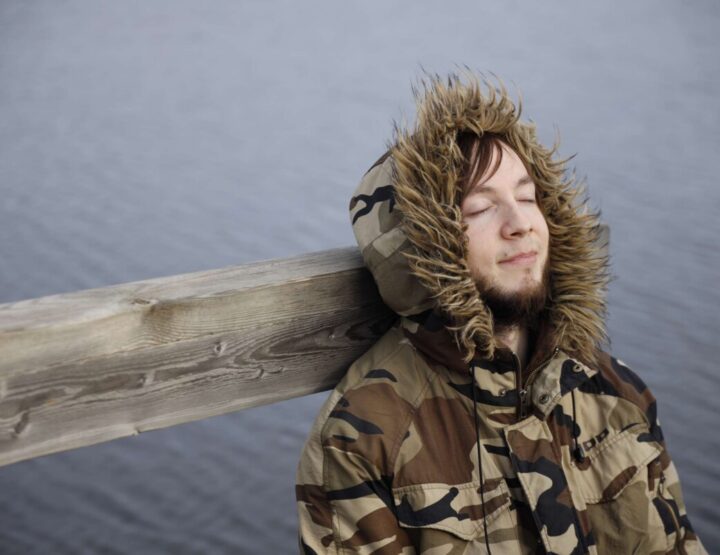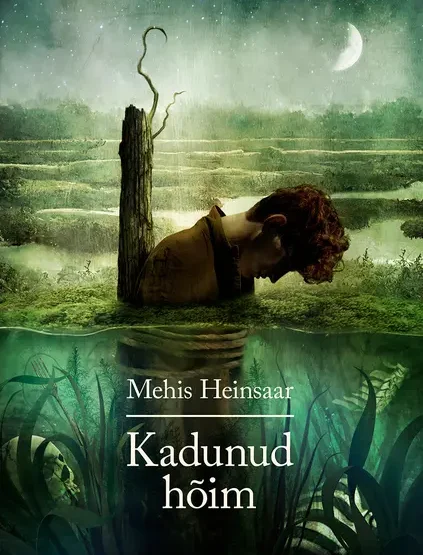The reception of Emil Tode’s Border State (1993) was shaped by multiple elements that were novel to Estonian literature of the time, including a homosexual motif and the book’s laconic, poetic, and confessional literary style.
Episodic, introspective novels told from a first-person perspective constitute the chief stylistic method of Tõnu Õnnepalu (with the exceptions of Princess, 1997 and Mandala, 2012). The shared basis for this is Õnnepalu’s understanding of the historical end of great epic novels, as a result of which it is possible for an author to seek their literary voice and invent an autobiographical narrator. Thus, Õnnepalu’s main medium has been the personal diary format, though the protagonist is always a fictional character, a literary speaker who shouldn’t be totally equated to the author himself. Õnnepalu has emphasized this distinction with his use of various pseudonyms: Emil Tode is the name used for Border State, and Anton Nigov for his 2002 novel Exercises.
Border State was Õnnepalu’s debut novel. Its title has always played a key role in interpreting the text, being primarily about an Eastern European’s migration to the West, to Paris, to the Free World, which sharply illuminates the new historical situation of the early 1990s. The mutually alienating meeting of Eastern and Western Europe, and the contrast between the two. Indeed, the concepts of a ‘border state’, and particularly of any ‘border’, are important metaphors in the book that lose no significance in Õnnepalu’s later works. The author’s idea of a border strays somewhat from its classical semiotic treatment, in which a border is something productive that generates semiosis between opposing sides. This notion isn’t missing from Border State, though there’s also something original to Õnnepalu’s presentation: one standing at a border is simultaneously invisible. They not only connect or mediate the opposing sides but, in a way, also transcend and negate them. In doing so, the individual remains an unseen and even ghostly entity between worlds. The specter is unable to truly fit into a single predefined group or reality, and turns out to be unadapted; an outcast. However, this is compensated for by a uniquely perceptive fate that comes along with the position: one sees more when standing upon a border, with views to both sides. This, I might add, doesn’t only apply in a geopolitical sense, meaning in views of the East and the West. Ultimately, the person sees an array of times: the modern, where vehicles zoom onto a highway, and the pre-modern, ‘thousand-year’ world that is symbolized in the novel by a sunny field and the figure of a woman bowing down before it. Standing on a border, it is possible to see a number of great mental currents all at once: technological civilization and the progressiveness that follows, and on the other side the old, traditional world of fields and lush nature. Seeing these times also makes Õnnepalu a fascinating observer of history, though it does often lead him to grim and resigned conclusions regarding the health of humanism. He isn’t utterly enchanted by modern and progressive ideals, nor by romantic and backward reactions, though he naturally acknowledges their impact on, and grasp over, people.
Breaking Self-Colonization
In addition to its unique border conception, Border State possesses an intriguing and significant connection to the efforts of the early 20th-century literary group Noor-Eesti (Young Estonia), for which Paris, as a hub of literature and art, played the role of a cosmopolitan metropole. One could even go so far as to say that the narrator of Tode/Õnnepalu’s novel fulfills and completes Noor-Eesti’s endeavor. In that sense, he is the herald of a new stage, a new era.
How so? In Border State, the protagonist’s partner, host, and patron—a philosophy professor named Franz—dies. The professor preached about Kierkegaard, Nietzsche, Foucault, and Derrida, however, the narrator ceases to believe in these things. Whether the professor’s mysterious death was due to suicide or foul play is to be determined by a police investigation; in any case, the event is undoubtedly symbolically charged. Although Franz rails on about socialist ideals, his hypocrisy is revealed when he ends up bent over a newspaper, scanning it for stock prices because he’s inherited a portfolio from relatives. Franz was no true revolutionary, Marxist, or believer. In the end, he placed more faith in his stocks than in any lofty ideal. So perishes philosophy. In a sense, it is already a living corpse in the form of Franz. In Tode/Õnnepalu’s Paris, “European philosophy” is given a symbolic end—if not for an Eastern European, then at least for an Estonian. However, this means that the Paris of Border State does not bring along self-colonization: here, no philosophy, teaching, or ideology is taken and exported to immature, behind-the-times Estonia.
Noor-Eesti’s European aspirations have since been analyzed in terms of self-colonization; of “catching up” to the West. Border State finds its way to Paris, but instead of bowing before the pantheon of philosophers, the narrator finds that the gods no longer deserve to be worshiped. The philosophy professor’s death is symbolic, not barbaric: it stands for neither the defiant rejection of Western culture nor its stubborn denial. Simply, the status of the former cultural idol is lost—one that required a gap between the educated and the uneducated, the enlightened and the inferior.
Thus, a certain individuality emerges with its own strong historical consciousness, unblinded by the West. It learns no epigenous philosophy, politics, or ideology, but instead perceives its own aliveness and singularity. It is pronouncedly sense-oriented, yearning, and feeling. Still, it isn’t archaic or primitive, but educated and self-aware. The new individuality that surfaces now becomes subject matter for the narrator: what is it? How should he live? In what way should he interpret himself? In what form should he exist? His point of departure is standing on a border and the invisibility and ghostliness that comes with it. However, this very territorial ambivalence is the needed condition for those questions to arise, fresh and undisturbed, at all.
The Firstness of Nature
The philosophy professor’s death is more like a slave-driver’s death, marking the end of a particular slave mentality and the birth of a new, free voice. However, that voice tends to be searching, confessional, divulging, struggling with illusions, and pursuing form and sense for its freedom. That voice becomes a unique traveler and truth-seeker.
Border State is certainly a romance, though the narrator’s relationship with nature grows to be important and, perhaps, primary to his relationships with humans. Õnnepalu’s prose and poetry contain an abundance of allusions to an “ecological” worldview and to posthumanism, according to which there is currently a great demand for finding alternatives to a global civilization governed by an economy that is exhausting and transforming the planet. One passage references the classic Estonian poet and prose writer Juhan Liiv (1864–1913):
“[…] there was a little clearing, or rather a sparse place among the straight pines, covered by thick, level heather, upon which a little autumn sunlight still spilled—there, I always stood still, my feet in the sand, like a pine, thinking: ‘The beauty of this world.’ […] ‘Oh! I would’ve wanted to wrap my arms around that clearing, to embrace it, to protect it, to shield it with my puny body, just like I wanted to shield you, Angelo, but my arms are so short.’”
That little clearing there among the pines, where the protagonist recognizes “the beauty of this world” and feels the need to hold and protect it, is an uncolonized, unsettled, and sacred place that cannot be transformed, divested, sold off, or exploited. This untouched natural place can, metaphorically, be seen as the place of individuality; its root and source. The protagonist of Border State feels firmer ground for his existence in nature than in human culture or civilization. This ground awakens love and care. The subject’s connection to the land is thereby revealed, a subject freed from the spell of culture and philosophy. Connections to land and the land’s firstness are some of the most fascinating threads in Õnnepalu’s later works, the most tangible of which can be found in his 2019 novel Acre.
This topic is not exhausted within the clearing amongst the pines but grows to become almost a leitmotif of Border State when, near the beginning of the book, the narrator describes his “ideal landscape”: a simple, austere grassy area by the sea, the stalks “bobbing there in the incessant wind”. The protagonist muses about how he’d gladly be grass on that meadow, because he realizes that the ancient landscape is filled with much more vitality than man. In this sense, the lush grass is the “champion” of evolution for having lived long before humans and surviving long after: “In yearning to share that plant kingdom, I am actually yearning to become one of the chosen ones; one of the strongest.” He sees an eternal material in nature, to which human reality is merely temporary, fleeting. Thus, there is nothing distant, different, or threatening about nature. Humans are made from it and interwoven with it. The elementary exploration of nature and turning to it are the true sources of love and humanity.
Hesitant Thinking
The notions in Border State that place the vegetative and meteorological ahead of human sophistry are, for the most part, ahead of their time and are presently underway in the current era to phrase the ecological and green worldviews and to theorize about them. In this sense, the philosophy professor’s death can be read as the end of the illusion of bettering the world. However, neither life nor the world ends with death: the new individuality, freed of enchantment, now turns back to itself. The self-description that ensues is a force that sets Õnnepalu’s writing into motion. It is a literary practice that probes, invents, and seeks itself, with hesitation at its core (in Exercises the author remarks that thinking begins with hesitation). In hesitation and being between two decisions (standing on a border!), a place in which there is no firm ground or clear truth, there is the opportunity for a path to be revealed: one that leads to a clearing, to nature and oneself, which is an event in which something holy and untouchable is experienced. Remaining with it, practicing it, protecting it—continues the task of thinking and of freedom. A thematic poem that explores Õnnepalu’s thinking can be found in his 1988 collection Ithaca: “What is This ‘Thinking’ of Mine”: “It is a child’s sob late in the dark in autumn / mouth hackberry-bloody hands cold / probing potato stalks and the smell of mounds / on a muddy field / Memories help him / find the way home / just as much as the stars, unseen / […]” Revealed even in these early poems are an interweaving of thought and perception, the thinking being both bodily and physical, and nature’s own action that cannot be divided from corporality. Nature is the manifestation of life’s mystery, from which the human quest for home originates and into which it journeys.
Thus, Border State contains many currents and motifs that have not lost their relevancy. The novel was written at a time when people spoke of “the end of history”, and reading it is a chance to travel back into those end-days. By now, we know, of course, that the “end” wasn’t really an end: history continues, and borders are deepening instead of disappearing. Border State continues along with it.
Joonas Hellerma (b. 1984) is a presenter and editor for Estonian Public Broadcasting and the host of the weekly cultural talk show Plekktrumm (Din Trum) on ETV2. He studied Film and Video at Tallinn University and has a master’s in Philosophy at the same university.
A longer version of this article was originally published in the weekly cultural newspaper Sirp (September 23, 2022).
by Joonas Hellerma
The reception of Emil Tode’s Border State (1993) was shaped by multiple elements that were novel to Estonian literature of the time, including a homosexual motif and the book’s laconic, poetic, and confessional literary style.
Episodic, introspective novels told from a first-person perspective constitute the chief stylistic method of Tõnu Õnnepalu (with the exceptions of Princess, 1997 and Mandala, 2012). The shared basis for this is Õnnepalu’s understanding of the historical end of great epic novels, as a result of which it is possible for an author to seek their literary voice and invent an autobiographical narrator. Thus, Õnnepalu’s main medium has been the personal diary format, though the protagonist is always a fictional character, a literary speaker who shouldn’t be totally equated to the author himself. Õnnepalu has emphasized this distinction with his use of various pseudonyms: Emil Tode is the name used for Border State, and Anton Nigov for his 2002 novel Exercises.
Border State was Õnnepalu’s debut novel. Its title has always played a key role in interpreting the text, being primarily about an Eastern European’s migration to the West, to Paris, to the Free World, which sharply illuminates the new historical situation of the early 1990s. The mutually alienating meeting of Eastern and Western Europe, and the contrast between the two. Indeed, the concepts of a ‘border state’, and particularly of any ‘border’, are important metaphors in the book that lose no significance in Õnnepalu’s later works. The author’s idea of a border strays somewhat from its classical semiotic treatment, in which a border is something productive that generates semiosis between opposing sides. This notion isn’t missing from Border State, though there’s also something original to Õnnepalu’s presentation: one standing at a border is simultaneously invisible. They not only connect or mediate the opposing sides but, in a way, also transcend and negate them. In doing so, the individual remains an unseen and even ghostly entity between worlds. The specter is unable to truly fit into a single predefined group or reality, and turns out to be unadapted; an outcast. However, this is compensated for by a uniquely perceptive fate that comes along with the position: one sees more when standing upon a border, with views to both sides. This, I might add, doesn’t only apply in a geopolitical sense, meaning in views of the East and the West. Ultimately, the person sees an array of times: the modern, where vehicles zoom onto a highway, and the pre-modern, ‘thousand-year’ world that is symbolized in the novel by a sunny field and the figure of a woman bowing down before it. Standing on a border, it is possible to see a number of great mental currents all at once: technological civilization and the progressiveness that follows, and on the other side the old, traditional world of fields and lush nature. Seeing these times also makes Õnnepalu a fascinating observer of history, though it does often lead him to grim and resigned conclusions regarding the health of humanism. He isn’t utterly enchanted by modern and progressive ideals, nor by romantic and backward reactions, though he naturally acknowledges their impact on, and grasp over, people.
Breaking Self-Colonization
In addition to its unique border conception, Border State possesses an intriguing and significant connection to the efforts of the early 20th-century literary group Noor-Eesti (Young Estonia), for which Paris, as a hub of literature and art, played the role of a cosmopolitan metropole. One could even go so far as to say that the narrator of Tode/Õnnepalu’s novel fulfills and completes Noor-Eesti’s endeavor. In that sense, he is the herald of a new stage, a new era.
How so? In Border State, the protagonist’s partner, host, and patron—a philosophy professor named Franz—dies. The professor preached about Kierkegaard, Nietzsche, Foucault, and Derrida, however, the narrator ceases to believe in these things. Whether the professor’s mysterious death was due to suicide or foul play is to be determined by a police investigation; in any case, the event is undoubtedly symbolically charged. Although Franz rails on about socialist ideals, his hypocrisy is revealed when he ends up bent over a newspaper, scanning it for stock prices because he’s inherited a portfolio from relatives. Franz was no true revolutionary, Marxist, or believer. In the end, he placed more faith in his stocks than in any lofty ideal. So perishes philosophy. In a sense, it is already a living corpse in the form of Franz. In Tode/Õnnepalu’s Paris, “European philosophy” is given a symbolic end—if not for an Eastern European, then at least for an Estonian. However, this means that the Paris of Border State does not bring along self-colonization: here, no philosophy, teaching, or ideology is taken and exported to immature, behind-the-times Estonia.
Noor-Eesti’s European aspirations have since been analyzed in terms of self-colonization; of “catching up” to the West. Border State finds its way to Paris, but instead of bowing before the pantheon of philosophers, the narrator finds that the gods no longer deserve to be worshiped. The philosophy professor’s death is symbolic, not barbaric: it stands for neither the defiant rejection of Western culture nor its stubborn denial. Simply, the status of the former cultural idol is lost—one that required a gap between the educated and the uneducated, the enlightened and the inferior.
Thus, a certain individuality emerges with its own strong historical consciousness, unblinded by the West. It learns no epigenous philosophy, politics, or ideology, but instead perceives its own aliveness and singularity. It is pronouncedly sense-oriented, yearning, and feeling. Still, it isn’t archaic or primitive, but educated and self-aware. The new individuality that surfaces now becomes subject matter for the narrator: what is it? How should he live? In what way should he interpret himself? In what form should he exist? His point of departure is standing on a border and the invisibility and ghostliness that comes with it. However, this very territorial ambivalence is the needed condition for those questions to arise, fresh and undisturbed, at all.
The Firstness of Nature
The philosophy professor’s death is more like a slave-driver’s death, marking the end of a particular slave mentality and the birth of a new, free voice. However, that voice tends to be searching, confessional, divulging, struggling with illusions, and pursuing form and sense for its freedom. That voice becomes a unique traveler and truth-seeker.
Border State is certainly a romance, though the narrator’s relationship with nature grows to be important and, perhaps, primary to his relationships with humans. Õnnepalu’s prose and poetry contain an abundance of allusions to an “ecological” worldview and to posthumanism, according to which there is currently a great demand for finding alternatives to a global civilization governed by an economy that is exhausting and transforming the planet. One passage references the classic Estonian poet and prose writer Juhan Liiv (1864–1913):
“[…] there was a little clearing, or rather a sparse place among the straight pines, covered by thick, level heather, upon which a little autumn sunlight still spilled—there, I always stood still, my feet in the sand, like a pine, thinking: ‘The beauty of this world.’ […] ‘Oh! I would’ve wanted to wrap my arms around that clearing, to embrace it, to protect it, to shield it with my puny body, just like I wanted to shield you, Angelo, but my arms are so short.’”
That little clearing there among the pines, where the protagonist recognizes “the beauty of this world” and feels the need to hold and protect it, is an uncolonized, unsettled, and sacred place that cannot be transformed, divested, sold off, or exploited. This untouched natural place can, metaphorically, be seen as the place of individuality; its root and source. The protagonist of Border State feels firmer ground for his existence in nature than in human culture or civilization. This ground awakens love and care. The subject’s connection to the land is thereby revealed, a subject freed from the spell of culture and philosophy. Connections to land and the land’s firstness are some of the most fascinating threads in Õnnepalu’s later works, the most tangible of which can be found in his 2019 novel Acre.
This topic is not exhausted within the clearing amongst the pines but grows to become almost a leitmotif of Border State when, near the beginning of the book, the narrator describes his “ideal landscape”: a simple, austere grassy area by the sea, the stalks “bobbing there in the incessant wind”. The protagonist muses about how he’d gladly be grass on that meadow, because he realizes that the ancient landscape is filled with much more vitality than man. In this sense, the lush grass is the “champion” of evolution for having lived long before humans and surviving long after: “In yearning to share that plant kingdom, I am actually yearning to become one of the chosen ones; one of the strongest.” He sees an eternal material in nature, to which human reality is merely temporary, fleeting. Thus, there is nothing distant, different, or threatening about nature. Humans are made from it and interwoven with it. The elementary exploration of nature and turning to it are the true sources of love and humanity.
Hesitant Thinking
The notions in Border State that place the vegetative and meteorological ahead of human sophistry are, for the most part, ahead of their time and are presently underway in the current era to phrase the ecological and green worldviews and to theorize about them. In this sense, the philosophy professor’s death can be read as the end of the illusion of bettering the world. However, neither life nor the world ends with death: the new individuality, freed of enchantment, now turns back to itself. The self-description that ensues is a force that sets Õnnepalu’s writing into motion. It is a literary practice that probes, invents, and seeks itself, with hesitation at its core (in Exercises the author remarks that thinking begins with hesitation). In hesitation and being between two decisions (standing on a border!), a place in which there is no firm ground or clear truth, there is the opportunity for a path to be revealed: one that leads to a clearing, to nature and oneself, which is an event in which something holy and untouchable is experienced. Remaining with it, practicing it, protecting it—continues the task of thinking and of freedom. A thematic poem that explores Õnnepalu’s thinking can be found in his 1988 collection Ithaca: “What is This ‘Thinking’ of Mine”: “It is a child’s sob late in the dark in autumn / mouth hackberry-bloody hands cold / probing potato stalks and the smell of mounds / on a muddy field / Memories help him / find the way home / just as much as the stars, unseen / […]” Revealed even in these early poems are an interweaving of thought and perception, the thinking being both bodily and physical, and nature’s own action that cannot be divided from corporality. Nature is the manifestation of life’s mystery, from which the human quest for home originates and into which it journeys.
Thus, Border State contains many currents and motifs that have not lost their relevancy. The novel was written at a time when people spoke of “the end of history”, and reading it is a chance to travel back into those end-days. By now, we know, of course, that the “end” wasn’t really an end: history continues, and borders are deepening instead of disappearing. Border State continues along with it.
Joonas Hellerma (b. 1984) is a presenter and editor for Estonian Public Broadcasting and the host of the weekly cultural talk show Plekktrumm (Din Trum) on ETV2. He studied Film and Video at Tallinn University and has a master’s in Philosophy at the same university.
A longer version of this article was originally published in the weekly cultural newspaper Sirp (September 23, 2022).





